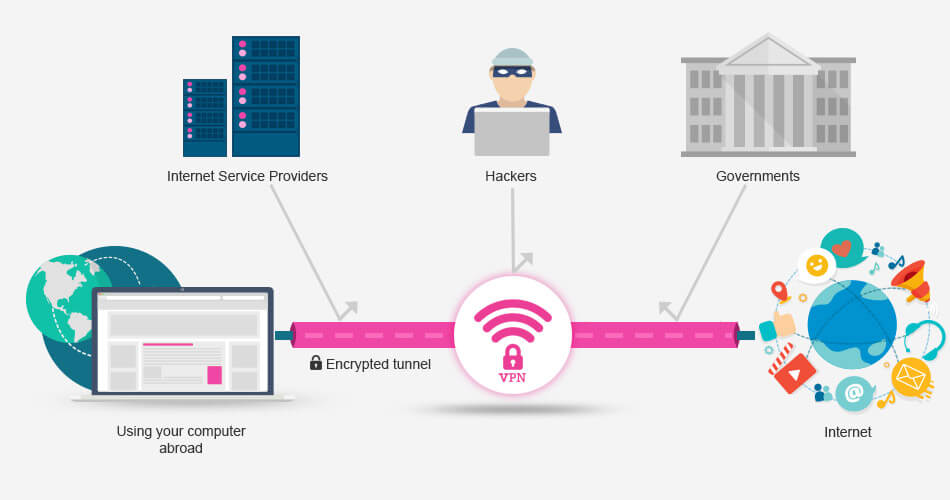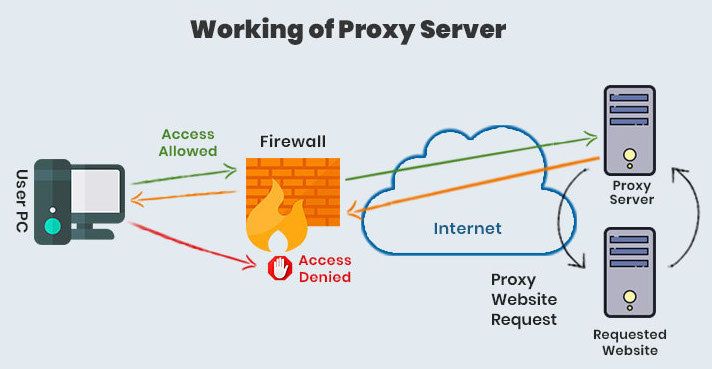Are you looking for something to protect your privacy and access content banned in your country? Are you confused between Proxy and VPN? Here is everything about VPN and Proxy which you need to know and which one to choose.

When you want to access the Internet privately and hide your IP address, you can use a VPN or Proxy Service. Although both Proxy and VPN help to mask your IP and prevent you from being identified on Internet, the way they act is quite different. In this guide, we will discuss each of these tools and the right time to use them in order to deconstruct the concepts.
What is VPN?

Virtual Private Networks (VPNs) “mask” the source of your data, making it appear to be coming from another location. Nevertheless, the similarities end there.
VPNs are configured at the operating system level, which means that they are able to redirect all traffic from a device. In addition, all data is subjected to a rigorous encryption process, which involves wrapping information and traffic through a totally secure tunnel that connects your computer to a remote network.
On the other hand, in a VPN, data is subjected to a rigorous encryption process and travels through secure tunnels that connect the user’s computer with the private network.
How to choose a VPN
As you may be wondering at this point, a VPN is ideal for data traffic of any nature, as it keeps your privacy and anonymity intact and inaccessible by the internet provider or any malicious individual who wants to intercept the communication.
So, use it without fear, regardless of whether you just want to check your Facebook profile or access confidential data on your company’s corporate network. Nor does it matter if you are in a public or private location, or the Wi-Fi connection of a particular establishment is as suspicious as possible: using a VPN, all of these concerns will no longer exist.
Obviously, so much security comes at a price. The best VPN services are not free and require a paid subscription.
If this is an obstacle for you, it is worth the advice to be aware of the terms of service, which can vary greatly from one VPN to another. In most cases, providers set a monthly data traffic limit, failing to offer protection after quota limits. In such cases, look for services that offer unlimited bandwidth – although they cost a little more, it is one less inconvenience for you to worry about.
Tip: VPNs offer at least once a month lifetime subscription for the price of one year of subscription. That is, you pay for a one-year subscription and can use the VPN for the rest of your life, without having to worry about renewing the service. You can find offers and discounts on best vpn deals page. So keep an eye out and follow the offers daily.
What is a proxy?

A proxy is a service that acts as an intermediary between the user and the internet, receives and forwards all your requests to the website you are accessing. Thus, the IP registered on these accessed pages is that of the proxy and not yours. Proxies only mask the user’s IP address, leaving all data traffic open, with no layer of protection or encryption.
There are several types of proxies. The type of company servers centralize the connection of all computers connected to it and, when they access Internet, they do so by a single IP address, as a way to speed up the connection.
There are also web proxies, programs that mask your IP, which are widely used by people who want to access the internet anonymously, or use products and services from other regions; for example, access the United States Netflix catalog, or connect to competitor Hulu.
As it does not encrypt any data between your computer and the server, a proxy should never be used to transmit sensitive data over the internet. So here is the alert: never access your bank account, make online purchases or anything that involves sensitive information about you, believing you are safe behind a proxy, because you won’t be.
How to choose a proxy
There are plenty of free proxies available on the internet, but most offer absurd latency that frustrates even the most calm of users. Knowing this, these free options are indicated only for sporadic use and never for everyday use. A good tip is to access Proxy4Free , which offers a huge list of free servers that can be used by anyone.
In addition, there are also commercial and paid options like Smartproxy, BTGuard. These services generally also offer basic VPNs to increase security. Although this is not the safest or recommended alternative, it is certainly ideal for those seeking protection at a lower cost than the VPN services currently available on the market.
Proxy and VPN : What are Differences
Below is a complete explanation of the 7 differences you can learn about proxy servers and VPNs. So, when you want to decide to make yourself anonymous on the internet network that you access, you have several ways such as using a VPN or Proxy. And when you want to be completely safe, you have to know what the difference is between the two.
Access to Internet
- VPN: A VPN service allows you to access all blocked websites on Internet. Whether it’s blocked by the government, ISP or where you are connected to the internet
- Proxy: The proxy server cannot bypass firewalls, therefore, there are still many restrictions on the use of a proxy server.
Anonymity
- VPN: VPN service providers can completely hide your real IP address, no one can steal your privacy information and snoop on your internet traffic.
- Proxy: The proxy server owner knows your real IP address and can monitor traffic on non-HTTPS websites, so you are not completely anonymous.
Connection speed
- VPN: VPNs can provide fast network connection speeds even very fast to help you improve your online experience.
- Proxy: Unlike when using a proxy server, the continuous routing of traffic from your computer to an intermediate server can cause your Internet speed to drop.
Select Location
- VPN: VPN services offer hundreds of server addresses that you can choose from.
- Proxy: Proxy server does not have geographic location selection function.
Privacy and Security
- VPN: VPN encrypts all information, data and hides your real IP address, so it can completely protect your privacy and security.
- Proxies: Not all proxy servers use SSL connections, so there is a risk of cyber attack and it’s likely that your whereabouts will still be traced.
Device Compatibility
- VPN: VPN applications can run on all systems, both computers and smartphones, such as Windows, Android, iOS, Mac, etc.
- Proxies: Proxies are only available for certain occasions or only work with web browsers like Chrome , Firefox, Opera, etc.
Stability
- VPN: Once the data is encrypted, the VPN won’t be interrupted often, so the VPN is stable.
- Proxy: Proxy servers are often interrupted due to traffic on intermediate servers.
Conclusion
In short, a VPN can be used for free Internet access, protect your privacy and security, it is 100% reliable. In relative terms, proxy servers are less trustworthy and most of them have very slow connections, plus their limited usage can only be used via a web browser or in certain applications.